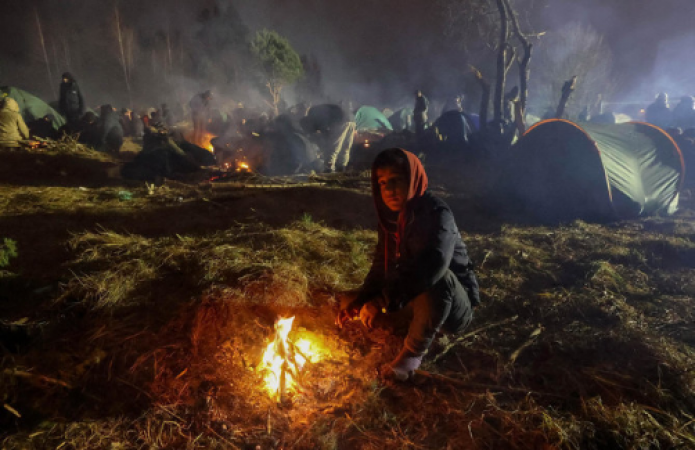
Latvia: In response to a dramatic increase in migrant arrivals at its border with Belarus, Latvia's government has taken the unprecedented step of deploying the military to assist overwhelmed border guards. The surge in migrant crossings has raised concerns within the Latvian government, which has found itself struggling to manage the influx effectively.
The military's role will encompass various tasks, including the construction of physical barriers along the border, logistical support for border guards, patrolling the border, and deterring migrants from attempting illegal crossings. The Latvian government announced this decision on September 13, 2023, signaling its mounting apprehension over the evolving situation at the border.
The upsurge in migrant arrivals commenced in the summer of 2023, predominantly consisting of individuals from Iraq, Syria, and Afghanistan. These migrants are being transported to the Latvian border by Belarusian authorities, who are accused of exploiting their plight as a political leverage point against the European Union (EU).
The EU has widely condemned the actions of the Belarusian government, imposing sanctions as punitive measures. However, these sanctions have not yet succeeded in dissuading the flow of migrants through Belarus.
Latvia is now urging the EU to intensify its support in managing the crisis and has called for the EU to close the border separating Latvia from Belarus, heightening the diplomatic tensions surrounding the issue.
The crisis at the Latvian-Belarusian border poses a formidable challenge for the EU, testing its capacity to address the migrant influx while straining its relations with Belarus.
Escalation of Migrant Arrivals: The surge in migrants attempting to cross the Latvia-Belarus border has intensified significantly, with the number of daily crossings surging from approximately 100 in July to over 500 in September. This rapid escalation has strained Latvia's capacity to handle the influx.
Also Read: Poland Procures Nearly 500 HIMARS Launchers in Landmark Defense Deal
Diverse Migrant Profile: The migrants predominantly consist of men, but there are also women and children among them. The diverse composition of migrants underscores the complexity of the situation.
Belarusian Facilitation: Belarusian authorities have been transporting migrants to the border using buses and trucks, playing a crucial role in facilitating their journeys. This tactic has triggered international condemnation, as Belarus is accused of weaponizing migrants to apply pressure on the EU.
Healthcare Needs: Many migrants arriving at the Latvia-Belarus border are in poor health, requiring immediate medical attention. This added healthcare burden poses further challenges for Latvian authorities already grappling with the crisis.
Reception Center Struggles: Latvia has established a reception center for the migrants, but it is grappling with the overwhelming number of arrivals. The facility is currently struggling to provide the necessary accommodations and support to migrants, adding to the urgency of the situation.
EU Assistance: While the EU has pledged support to Latvia in addressing the crisis, the specifics of this assistance remain unclear. The EU's efforts to navigate this multifaceted issue underscore the complexity of the challenge posed by the surge in migrant arrivals at the Latvia-Belarus border.
Complex Diplomatic Situation: The crisis at the Latvia-Belarus border has significantly complicated diplomatic relations between the EU and Belarus. The EU's condemnation of Belarus's role in the crisis, combined with the imposition of sanctions, has created a challenging diplomatic landscape.
Also Read: Exploring Europe's Enigmatic Megalithic Structures
As the situation at the Latvia-Belarus border continues to evolve, it becomes increasingly evident that there are no easy solutions to this multifaceted challenge.
Latvia, along with its EU partners, is diligently working to develop a comprehensive strategy for managing the crisis effectively. However, given the complexity of the issue and the diplomatic tensions it has engendered, it is likely to be a protracted and arduous process that requires careful coordination and cooperation among all stakeholders.